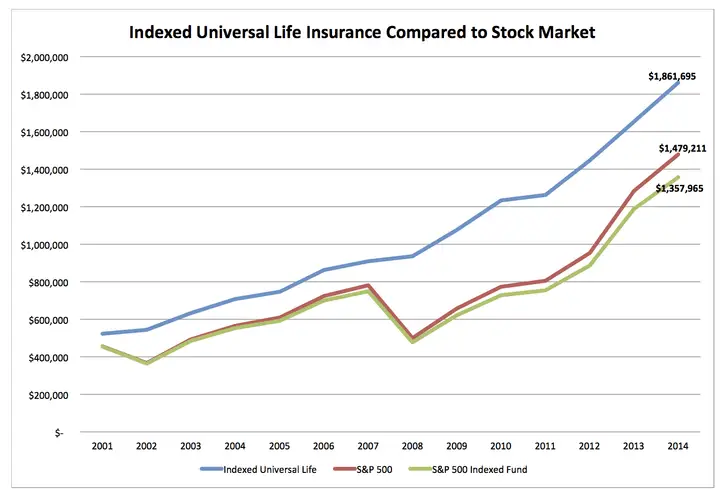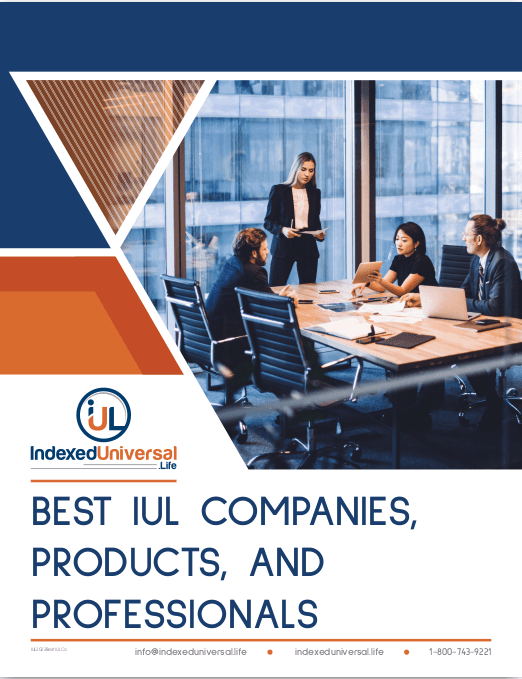All Categories
Featured
Table of Contents
1), commonly in an attempt to defeat their classification averages. This is a straw male disagreement, and one IUL folks like to make. Do they compare the IUL to something like the Lead Overall Stock Exchange Fund Admiral Show no lots, a cost ratio (ER) of 5 basis factors, a turn over proportion of 4.3%, and an exceptional tax-efficient document of circulations? No, they compare it to some horrible actively taken care of fund with an 8% load, a 2% ER, an 80% turnover proportion, and a dreadful record of temporary funding gain distributions.
Mutual funds commonly make yearly taxed circulations to fund owners, also when the value of their fund has actually dropped in value. Common funds not only call for revenue coverage (and the resulting annual taxation) when the common fund is increasing in worth, however can also impose income tax obligations in a year when the fund has actually decreased in value.
You can tax-manage the fund, harvesting losses and gains in order to decrease taxable distributions to the investors, however that isn't in some way going to alter the reported return of the fund. The ownership of shared funds may require the mutual fund proprietor to pay projected tax obligations (index universal life insurance quotes).

IULs are simple to place to ensure that, at the proprietor's fatality, the beneficiary is not subject to either income or estate taxes. The exact same tax decrease techniques do not work virtually too with shared funds. There are numerous, commonly pricey, tax obligation traps linked with the moment trading of shared fund shares, traps that do not apply to indexed life insurance policy.
Chances aren't really high that you're mosting likely to be subject to the AMT due to your shared fund distributions if you aren't without them. The rest of this one is half-truths at ideal. For circumstances, while it holds true that there is no revenue tax obligation due to your beneficiaries when they inherit the earnings of your IUL plan, it is additionally real that there is no revenue tax because of your successors when they inherit a common fund in a taxed account from you.
Iul Calculator
There are much better means to stay clear of estate tax concerns than getting investments with low returns. Shared funds may cause earnings taxation of Social Security benefits.

The development within the IUL is tax-deferred and may be taken as tax free income via financings. The plan owner (vs. the mutual fund manager) is in control of his/her reportable revenue, thus allowing them to reduce or perhaps eliminate the taxes of their Social Safety benefits. This set is wonderful.
Below's an additional minimal problem. It's true if you buy a common fund for state $10 per share simply prior to the distribution day, and it disperses a $0.50 circulation, you are then mosting likely to owe taxes (possibly 7-10 cents per share) although that you have not yet had any kind of gains.
In the end, it's really concerning the after-tax return, not just how much you pay in taxes. You're likewise possibly going to have even more money after paying those tax obligations. The record-keeping needs for possessing mutual funds are considerably extra complex.
With an IUL, one's records are kept by the insurance provider, copies of yearly statements are sent by mail to the proprietor, and circulations (if any type of) are completed and reported at year end. This is likewise sort of silly. Of course you ought to keep your tax documents in situation of an audit.
Low Cost Universal Life Insurance
Hardly a reason to buy life insurance coverage. Mutual funds are typically component of a decedent's probated estate.
Additionally, they undergo the hold-ups and expenditures of probate. The proceeds of the IUL policy, on the various other hand, is constantly a non-probate circulation that passes beyond probate directly to one's called beneficiaries, and is consequently not subject to one's posthumous creditors, unwanted public disclosure, or comparable delays and costs.
Medicaid incompetency and life time revenue. An IUL can give their owners with a stream of income for their entire life time, no matter of exactly how long they live.

This is beneficial when arranging one's affairs, and transforming possessions to income prior to a retirement home confinement. Mutual funds can not be transformed in a similar way, and are nearly always thought about countable Medicaid properties. This is another silly one supporting that poor people (you recognize, the ones that need Medicaid, a government program for the poor, to pay for their nursing home) should utilize IUL as opposed to shared funds.
Life Insurance Tax Free Growth
And life insurance coverage looks dreadful when contrasted relatively against a pension. Second, people that have cash to get IUL over and beyond their retirement accounts are mosting likely to need to be horrible at taking care of cash in order to ever get approved for Medicaid to pay for their assisted living facility expenses.
Chronic and terminal health problem cyclist. All policies will enable a proprietor's simple accessibility to cash money from their policy, often forgoing any surrender penalties when such people endure a serious illness, need at-home care, or come to be restricted to a retirement home. Mutual funds do not supply a comparable waiver when contingent deferred sales costs still relate to a shared fund account whose owner requires to offer some shares to fund the expenses of such a keep.
Index Assurance
You obtain to pay even more for that benefit (motorcyclist) with an insurance plan. Indexed universal life insurance policy gives death advantages to the recipients of the IUL proprietors, and neither the owner neither the beneficiary can ever shed cash due to a down market.
I definitely don't need one after I reach monetary independence. Do I desire one? On standard, a purchaser of life insurance coverage pays for the true price of the life insurance coverage advantage, plus the costs of the plan, plus the earnings of the insurance policy company.
Universal Benefits Insurance
I'm not totally certain why Mr. Morais included the entire "you can't lose money" once more below as it was covered rather well in # 1. He just wished to repeat the very best selling point for these points I suppose. Once again, you don't shed nominal bucks, but you can shed real bucks, as well as face significant possibility price as a result of reduced returns.

An indexed universal life insurance coverage plan proprietor may trade their plan for an entirely various plan without causing earnings taxes. A common fund owner can not relocate funds from one mutual fund firm to one more without offering his shares at the former (thus triggering a taxed event), and repurchasing new shares at the latter, often subject to sales charges at both.
While it is real that you can trade one insurance coverage for another, the factor that individuals do this is that the very first one is such a terrible policy that also after purchasing a brand-new one and experiencing the very early, unfavorable return years, you'll still come out ahead. If they were sold the right policy the very first time, they shouldn't have any desire to ever before exchange it and experience the early, negative return years once again.
Latest Posts
Ul Mutual Insurance
Universal Life Policy Vs Term
Index Assurance